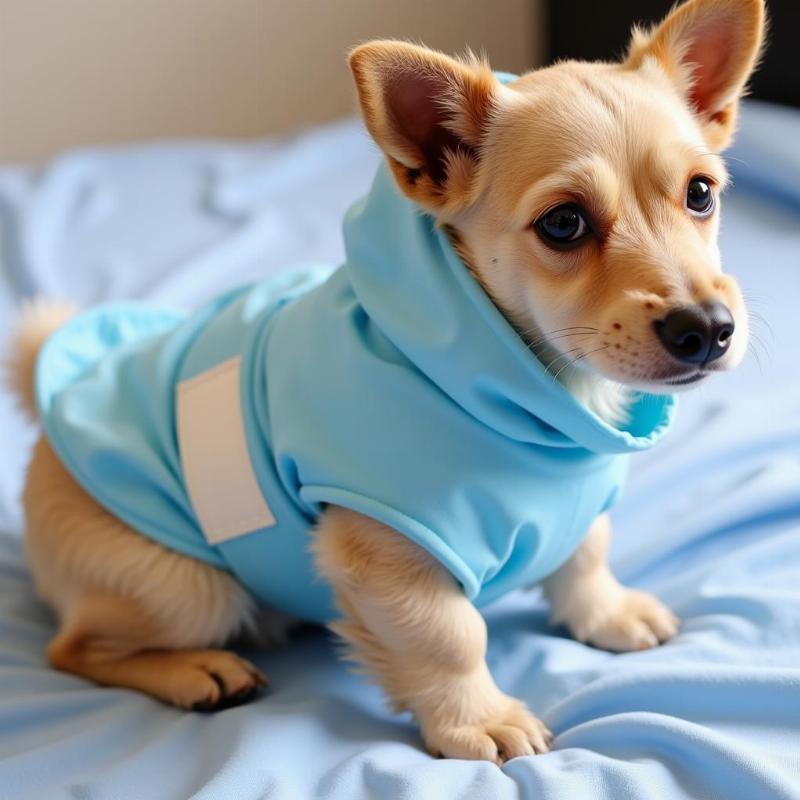Stopping your dog from scratching a wound is crucial for proper healing and preventing infection. Whether it’s a surgical incision, a hot spot, or a scrape, constant scratching can delay recovery and lead to more serious complications. This article will provide practical tips and strategies to help you protect your dog’s wound and promote healing.
Understanding Why Dogs Scratch Wounds
Dogs scratch wounds for a variety of reasons. It can be due to itchiness caused by the healing process, discomfort, pain, or even boredom. Sometimes, underlying allergies or skin conditions can exacerbate the itching. Understanding the root cause can help you choose the most effective approach to stop the scratching.
Effective Methods to Stop Dog Scratching
Several strategies can be employed to prevent your dog from aggravating a wound:
-
The Cone of Shame (Elizabethan Collar): While not the most fashionable accessory, the cone is highly effective in preventing your dog from reaching most wounds. Make sure the cone is the right size – it should extend past your dog’s nose but not interfere with eating or drinking.
-
Protective Clothing: Surgical recovery suits or t-shirts can cover wounds and provide a barrier against scratching. These are particularly useful for wounds on the body or torso.
-
Bandages and Wound Dressings: Covering the wound with a clean bandage can help protect it and reduce irritation. Ensure the bandage is secure but not too tight. Consult your vet for appropriate bandage types and changing frequency.
 Preventing dog from scratching wound with clothes
Preventing dog from scratching wound with clothes
-
Distraction and Engagement: Keeping your dog occupied with toys, puzzles, or training can help divert their attention away from the wound. Chew toys, especially those that can be frozen, can be particularly soothing.
-
Veterinary-Prescribed Medications: Your veterinarian may prescribe anti-itch medications or pain relievers to manage discomfort and reduce the urge to scratch. Never administer human medication to your dog without consulting your vet.
Addressing Underlying Issues
If your dog’s scratching persists, it’s essential to address any underlying issues that may be contributing to the problem:
-
Allergies: Allergies to food, environmental factors, or parasites can cause intense itching. Your veterinarian can perform allergy testing and recommend appropriate treatment.
-
Skin Infections: Bacterial or fungal infections can cause itching and inflammation. Your vet can diagnose and treat these infections with antibiotics or antifungals.
-
Parasites: Fleas, ticks, and mites can irritate the skin and lead to excessive scratching. Regular parasite prevention is essential.
Home Remedies and Natural Solutions
While it’s crucial to consult your vet for any medical concerns, some home remedies can offer supplemental relief:
-
Oatmeal Baths: Colloidal oatmeal has soothing properties and can help relieve itching. Add it to lukewarm bathwater and let your dog soak for 10-15 minutes.
-
Aloe Vera: Applying a small amount of pure aloe vera gel to the wound can help soothe irritation and promote healing. Ensure your dog doesn’t lick or ingest the aloe vera.
When to Seek Veterinary Attention
If your dog’s wound shows signs of infection (redness, swelling, pus, or a foul odor), or if the scratching is excessive despite your efforts, it’s essential to seek veterinary attention immediately. Delayed treatment can lead to serious complications.
Conclusion
Stopping your dog from scratching a wound requires patience, persistence, and a multi-faceted approach. By combining physical barriers, distraction techniques, and addressing any underlying medical conditions, you can help your furry friend heal comfortably and prevent further complications. Remember to consult with your veterinarian for personalized advice and treatment.
FAQs
-
How can I tell if my dog’s wound is infected? Look for signs of redness, swelling, pus, a foul odor, or increased heat around the wound area.
-
Can I use human antiseptic cream on my dog’s wound? No, it’s best to avoid using human products on your dog without consulting your vet. Some human medications can be toxic to dogs.
-
How long does it usually take for a dog’s wound to heal? Healing time varies depending on the type and severity of the wound. Superficial scrapes may heal within a week, while surgical incisions can take several weeks or longer.
-
What can I do if my dog keeps licking the wound? Licking can introduce bacteria and delay healing. Try using a bitter-tasting spray or an Elizabethan collar to deter licking.
-
My dog is anxious and stressed about the wound. What can I do? Creating a calm and comfortable environment can help reduce your dog’s anxiety. Talk to your vet about using calming aids or pheromone diffusers.
-
How can I keep my dog entertained while wearing a cone? Offer interactive toys, puzzles, or engage in gentle training sessions. Frozen treats or chew toys can also provide distraction and comfort.
-
Is it normal for a dog’s wound to itch during healing? Yes, some itching is normal as the wound heals. However, excessive scratching can indicate a problem.
Beautdogs.us is your premier source for comprehensive and engaging information on all aspects of dog care, breed-specific advice, and top-quality products in the US. Whether you’re a seasoned dog owner or just starting your journey, Beautdogs.us provides expert guidance on everything from nutrition and training to health and wellness. Connect with us for personalized support and discover the perfect resources for your canine companion. Email: [email protected], Phone: +1 501-555-7529. Visit Beautdogs.us today to learn more!